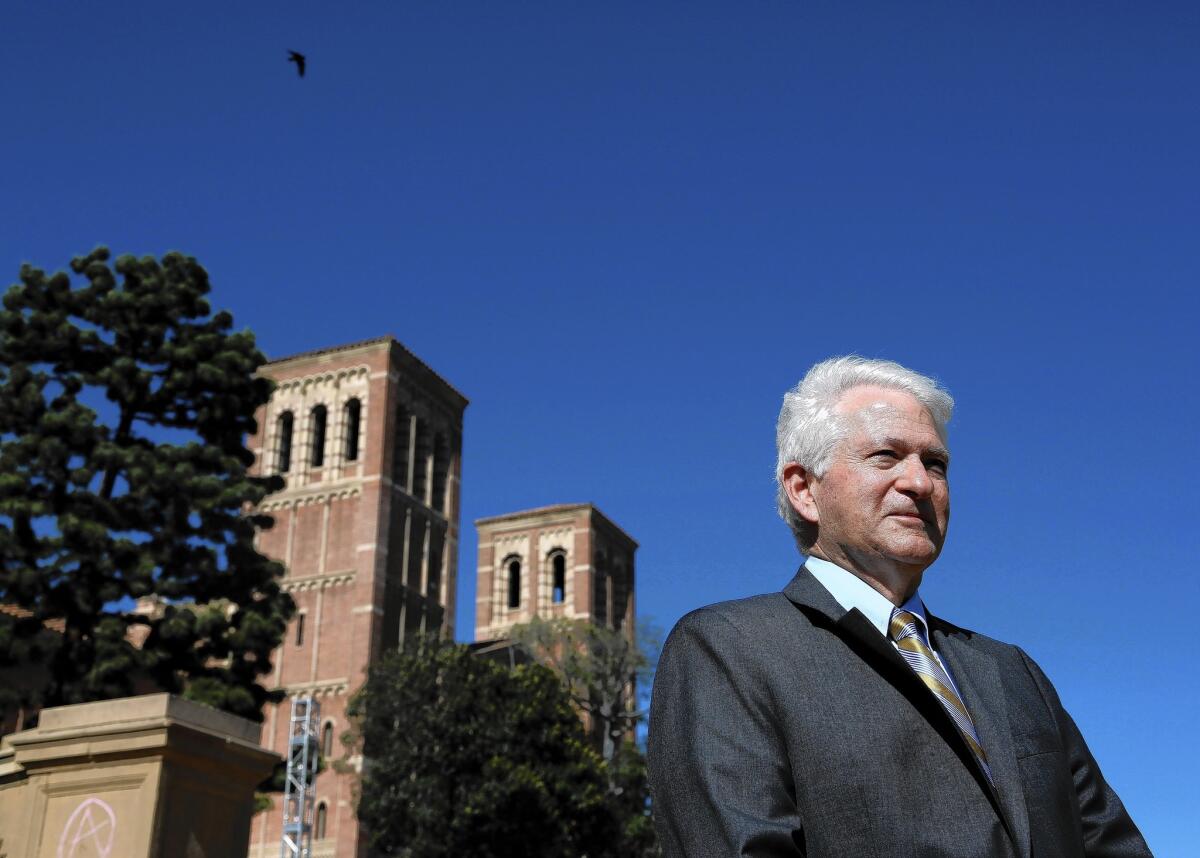UCLA plans $4.2-billion fundraising drive to mark 2019 centennial

UCLA has announced the public start of a $4.2-billion fundraising campaign — the largest such effort of any state university in the country — to increase student financial aid, bolster faculty hiring and research, and construct new campus buildings.
The campaign ties in with UCLA’s centennial in 2019, marking 100 years since Angelenos battled the Berkeley-centric education establishment and finally got the Legislature to approve a southern branch of the University of California.
UCLA has already raised about $1.3 billion toward its target in a so-called quiet phase that began in 2011 and includes several large donations, according to campus officials. They said they are confident that the economic recovery and stock market’s climb will help them reach their goal by 2019’s end.
UCLA Chancellor Gene Block pointed to several recent rankings of research universities worldwide and noted that UCLA is often the only one in the top dozen that was founded in the 20th century; others go as far back as 1636 for Harvard and the 12th century for Oxford.
“This is an extremely young institution that has done extremely well. We want to do even better in the next century and we need resources to do that,” said Block, who has been chancellor of the 42,190-student campus since 2007.
The Westwood school aims to surpass previous records for UC fundraising set last year by UC Berkeley, concluding a $3.13-billion drive, and by UCLA’s last campaign, which ended in 2005 with $3.05 billion.
It would top the University of Michigan, which is seeking $4 billion in what had been the largest goal in public higher education. Experts say that public universities want to compensate for reductions in state support and to compete with private universities.
Private institutions are aiming even higher: Harvard announced last year that it would try to raise an unprecedented $6.5 billion by 2018 and beat the $6.2 billion that Stanford garnered in a campaign that ended in 2011. USC says it is halfway toward raising $6 billion by 2018.
National surveys show that donations to higher education are rising, particularly in large gifts, as donors shake off recession jitters that reduced giving in 2009.
Ann E. Kaplan, an official with the Council for Aid to Education, a group that studies such philanthropy, said UCLA has a good chance of success. “I don’t believe they would embark on it if it wasn’t a goal they can meet,” she said.
About $1.65 billion of UCLA’s goal is earmarked to expand and create research programs; $1 billion is for undergraduate scholarships and graduate fellowships; and $500 million for faculty support and endowments for more than 200 professorships. About $800 million would pay for construction projects, including a new stage, screen and studio complex for the School of Theater, Film and Television and new facilities in the engineering and medical schools.
UCLA also wants to significantly increase its endowment, which now totals about $2.6 billion and is considered modest given the size of the student body.
Extra financial aid would allow UCLA to match the offers with which private colleges recruit talented students, Block said. Additional funds for faculty salaries, labs and research will help retain and attract top scholars. “When they are deciding between here and USC, and here and Stanford, and here and Duke, the incentives make a big difference,” the chancellor said.
UCLA was stung last year when USC hired away a team of prominent neuroscientists with promises of new labs and other benefits.
With state cutbacks, UCLA has lost some ability to replace retiring and departing faculty on the tenure track. In its College of Letters and Science, the largest academic unit, the numbers of such permanent faculty declined by 7%, to 817, over the last four years while its ranks of undergraduates rose 10% to 26,045, officials said. Adjunct faculty and lecturers helped to fill in.
The Centennial Campaign for UCLA was formally unveiled Thursday night at an outdoor dinner ceremony attended by about 500 donors, administrators, faculty and alumni on Dickson Plaza. Banners were hung around campus with such slogans as “You Will See the Future” and “Impossible Will Be a Thing of the Past.”
Rhea Turteltaub, UCLA’s vice chancellor for external affairs, said the campaign would seek support from the 400,000 alumni and will tap other potential donors as well. These include non-alumni who come to UCLA for arts, sports or extension classes and those who were patients or relatives of those treated at its medical center and clinics.
“Those are doors through which people walk and feel connected to the university whether they actually earn a degree or not,” she said.
larry.gordon@latimes.com
Twitter: @larrygordonlat







